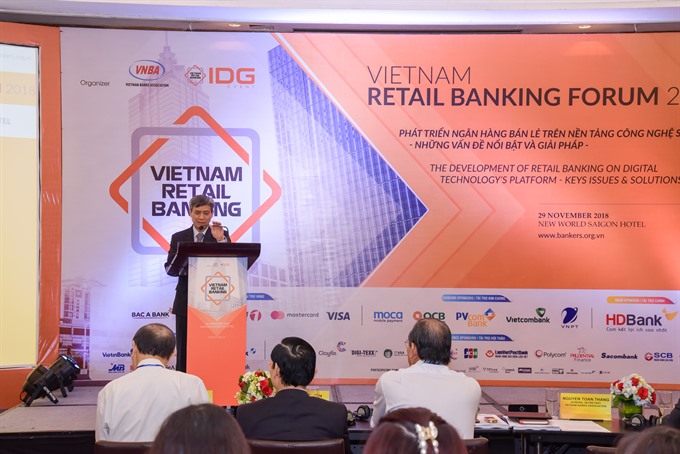 Economy
Economy

The retail banking segment has contributed significantly to the national bank system’s revenue this year.
 |
| VBA general secretary Nguyễn Toàn Thắng addresses the Việt Nam Retail Banking Forum 2018 in HCM City. — Photo IDG Vietnam |
HÀ NỘI — The retail banking segment has contributed significantly to the national bank system’s revenue this year.
At some major banks in Việt Nam, the segment has contributed more than 40 per cent of total revenue.
The information was released during the Việt Nam Retail Banking Forum 2018, themed “Optimising Retail Banking Channels in the Branch Network, Adapting to the Digital Age”, co-organised by the Việt Nam Banks Association (VBA) and IDG Việt Nam from November 28-29 in HCM City.
The event brought together banking, financial experts and leading technology experts to work towards solutions to help bank branches optimise services and attract more customers with the aim of ensuring sustainable development.
In recent years, Vietnamese banks had focused on the retail sector, a step in line with the current development trend and the State Bank of Việt Nam’s policy, VBA general secretary Nguyễn Toàn Thắng told the forum.
Furthermore, with non-cash payments trending along with the appearance of several fintech companies, Vietnamese commercial banks must focus on investing and co-operating on developing modern payment services to ensure safety and convenience for customers, he said.
Hà Huy Tuấn, vice chairman of the National Financial Supervisory Commission, said Vietnamese banks regarded the retail banking segment as a vital part of their development strategies.
However, he added there were still issues that needed to be addressed, especially in terms of technology such as data mining and processing, product and services development, and risk analysis and management.
The Fourth Industrial Revolution had made a considerable impact and is anticipated to create opportunities and motivation for Vietnamese banks to improve the retail banking sector, especially enhancing the application of innovative solutions and breakthrough technologies with the aim of leveraging business administration, automating business process and offering seamless experiences for customers, said Cấn Văn Lực, chief economist of the Bank for Investment and Development of Việt Nam.
The development of retail banking must focus on the synchronisation of databases and infrastructure, enabling banks to apply high technologies and catch up with market trends domestically and internationally.
In HCM City, the banking sector had experienced rapid growth over the past decade in terms of expertise, quantity and quality with diversified products and services.
According to Nguyễn Hoàng Minh, deputy director of the State Bank of Việt Nam’s branch in HCM City, the city has the largest banking network nationwide with over 2,200 transaction points and 49 head offices. From 2008–18, the city’s retail banking market had capital mobilisation growth and outstanding credit growth of 25 per cent and 24 per cent, respectively, higher than the national average, Minh said.
Retail banking is closely associated with consumer lending. In 2008, total outstanding loans for consumer lending accounted for only 3.8 per cent of total outstanding loans, but now it accounts for roughly 19.4 per cent.
However, according to experts, interest rates applied by some financial companies under banks are quite high, posing many risks.
The 6th annual Việt Nam Outstanding Banking Awards 2018 (VOBA) was also held at the forum. The ultimate purpose of the awards is to select and recognise banks reaching significant achievements in driving business growth and contributing to the development of the banking and financial sectors. — VNS




